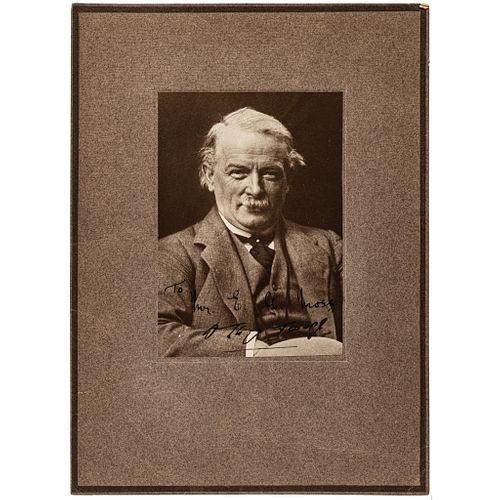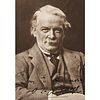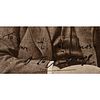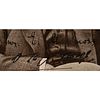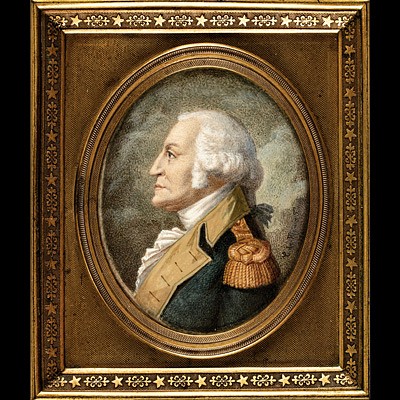Photograph Signed by British Prime Minister David Lloyd George
Lot 19
Categories
Estimate:
$300 - $400
Absentee vs Live bid
Two ways to bid:
- Leave a max absentee bid and the platform will bid on your behalf up to your maximum bid during the live auction.
- Bid live during the auction and your bids will be submitted real-time to the auctioneer.
Bid Increments
| Price | Bid Increment |
|---|---|
| $0 | $10 |
| $200 | $20 |
| $300 | $25 |
| $500 | $50 |
| $1,000 | $100 |
| $2,000 | $200 |
| $3,000 | $250 |
| $5,000 | $500 |
| $10,000 | $1,000 |
| $20,000 | $2,000 |
| $30,000 | $2,500 |
| $50,000 | $5,000 |
| $100,000 | $10,000 |
| $200,000 | $20,000 |
| $300,000 | $25,000 |
| $500,000 | $50,000 |
About Auction
By Early American History Auctions
May 22, 2021
Set Reminder
2021-05-22 12:00:00
2021-05-22 12:00:00
America/New_York
Bidsquare
Bidsquare : Autographs-Colonial-Political-Americana
https://www.bidsquare.com/auctions/early-american-history-auctions/autographs-colonial-political-americana-6913
302 Lots of Rare, Historic Autographs, Americana, Civil War Era, George Washington, Abraham Lincoln, Slavery & Black History, Revolutionary War Era, Colonial America, Federal Period, War of 1812, Colonial Currency, Indian Peace Medals & more... Early American History Auctions auctions@earlyamerican.com
302 Lots of Rare, Historic Autographs, Americana, Civil War Era, George Washington, Abraham Lincoln, Slavery & Black History, Revolutionary War Era, Colonial America, Federal Period, War of 1812, Colonial Currency, Indian Peace Medals & more... Early American History Auctions auctions@earlyamerican.com
- Lot Description
Autographs
David Lloyd George Signed Photo / British Prime Minister
DAVID LLOYD GEORGE (1863-1945). British Prime Minister 1916-1922, in 1908, he was named Chancellor of the Exchequer, in July 1916, he became Secretary of State for War, was Britain's chief Delegate to the Paris Peace Conference that drafted the Versailles Treaty.
Impressive Sepia-Photograph Signed, "D Lloyd George" beneath the inscription, "To Mr. E.A. Moss", Choice Extremely Fine. The Photograph image measures 5.75" x 4" and is affixed to a larger card stock measuring to 10.75" x 8" and matted for display. A vivid image, signed in black ink in its lower portion. Handsome.
DAVID LLOYD GEORGE. British Prime Minister.In 1905, Prime Minister Sir Henry Campbell-Bannerman appointed Lloyd George as President of the Board of Trade. In 1908, he was named Chancellor of the Exchequer in the government of H. H. Asquith.
Lloyd George's 1909 budget has been called the 'people's budget' since it provided for social insurance that was to be partly financed by land and income taxes. The budget was rejected by the House of Lords. This, in turn, led directly to the Parliament Act of 1911 by which the Lords lost their power of veto.
Lloyd George remained Chancellor of the Exchequer through the early years of World War I. In 1915, he was appointed Minister of Munitions in Asquith's wartime coalition government. In July 1916, he became Secretary of State for War, but was increasingly critical of Asquith. In December 1916, with the support of the Conservative and Labour leaders, he replaced Asquith as Prime Minister.
Lloyd George's achievements in the last two years of the war included persuading the Royal Navy to introduce the convoy system and the unification of the Allied military command under the French General Ferdinand Foch.
At the successful conclusion of the war, Lloyd George was Britain's chief delegate to the Paris Peace Conference that drafted the Versailles Treaty. He remained Prime Minister, the last Liberal Prime Minister, although now dependent on Conservative support. In 1921 he secured the settlement that established the Irish Free State.
In the summer of 1922, Lloyd George was involved in a scandal involving the selling of knighthoods and peerages. In October, the Conservatives withdrew from the coalition over their opposition to Britain's foreign policy in Turkey. Lloyd George resigned as Prime Minister.
Lloyd George remained in Parliament where he had served in the House of Commons since 1890. In 1944, he was made Earl Lloyd George of Dwyfor and entered the House of Lords.
Our Auction Contents:
Black History & Slavery: (Lots 1 - 63)
Abraham Lincoln Related: (Lots 64 - 74)
Historic Autographs: (Lots 75 - 235)
Colonial America: (Lots 236 - 261)
Revolutionary War: (Lots 262 - 304)
George Washington Related: (Lots 305 - 306)
Early American Guns & Weapons: (Lots 307 - 318) - Shipping Info
-
Early American provides in-house worldwide shipping. Please contact us directly if you have questions about your specific shipping requirements.
-
- Buyer's Premium



 EUR
EUR CAD
CAD AUD
AUD GBP
GBP MXN
MXN HKD
HKD CNY
CNY MYR
MYR SEK
SEK SGD
SGD CHF
CHF THB
THB